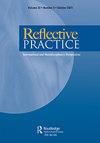‘[Now] that I look back, I’m like oh my goodness why did I think like that?’: using critical reflection in training Pharmacy Assistants and Pharmacy Dispensary Technicians working with Medication Assisted Treatment of Opioid Dependence: a case study from Australia
IF 1.6
Q2 EDUCATION & EDUCATIONAL RESEARCH
引用次数: 0
Abstract
ABSTRACT Despite recognition of the importance of critical reflection for professional development in social and health care – particularly regarding professional competency and self-awareness – the use of reflective practice in professional training has received less examination. This paper evaluates the use of critical reflection as a pedagogical approach in training allied health professionals – in this instance, training Pharmacy Assistants (PAs) and Pharmacy Dispensary Technicians (PDTs) towards increasing critical reflection of their service delivery to Medication Assisted Treatment of Opioid Dependence (MATOD) consumers. Specifically, this paper examines a) the embedding of a critical reflection model within training materials; and b) the experiences of participants who undertook this training, including their experiences of applying their learnings to professional practice. Findings present a mixed picture. Despite the training unearthing and deconstructing problematic values and assumptions in the service delivery of MATOD treatments in pharmacy settings, some participants found the recognition of their own biases and prejudices overwhelming. Hence, although the critical reflection model used in the analysis has enormous potential to tackle stigma and discriminatory attitudes towards opioid dependence and MATOD and improve professional practice, greater attention to scaffolding, designing and implementing the process of critical reflection is needed.“现在回想起来,我想,天哪,我为什么会那样想?”:在培训阿片类药物依赖药物辅助治疗的药房助理和药房技术人员时使用批判性反思:来自澳大利亚的案例研究
摘要尽管人们认识到批判性反思对社会和医疗保健专业发展的重要性,特别是在专业能力和自我意识方面,但在专业培训中使用反思实践却很少受到审查。本文评估了批判性反思作为一种教学方法在培训专职卫生专业人员中的应用——在本例中,培训药房助理(PA)和药房药房技术员(PDT),以增加对其向阿片类药物依赖性药物辅助治疗(MATOD)消费者提供服务的批判性反思。具体而言,本文研究了a)在训练材料中嵌入批判性反思模型;以及b)参加该培训的参与者的经历,包括他们将所学知识应用于专业实践的经历。调查结果喜忧参半。尽管在药房提供MATOD治疗的服务中,培训挖掘和解构了有问题的价值观和假设,但一些参与者发现,他们对自己的偏见和偏见的认识是压倒性的。因此,尽管分析中使用的批判性反思模型在解决对阿片类药物依赖和MATOD的污名化和歧视态度以及改善专业实践方面具有巨大潜力,但仍需要更多地关注批判性反思过程的搭建、设计和实施。
本文章由计算机程序翻译,如有差异,请以英文原文为准。
求助全文
约1分钟内获得全文
求助全文

 求助内容:
求助内容: 应助结果提醒方式:
应助结果提醒方式:


